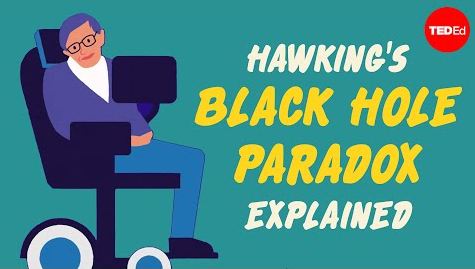Scientists work on the boundaries of the unknown, where every new piece of knowledge forms a path into a void of uncertainty.
科学家在未知的边缘进行探索,每一个新知识都为通往未知空间开辟了一条道路。
And nothing is more uncertain -- or potentially enlightening -- than a paradox.
而没有什么能比一个悖论更加具有不确定性和启发性。
Throughout history, paradoxes have threatened to undermine everything we know,
纵观历史,一个又一个的悖论已经颠覆了我们的认知,
and just as often, they've reshaped our understanding of the world.
并如同往常一样,它们重塑了我们对世界的理解。
Today, one of the biggest paradoxes in the universe threatens to unravel the fields of general relativity and quantum mechanics:
如今,一个宇宙中最有名的悖论扬言要阐释广义相对论和量子力学:
the black hole information paradox.
这就是黑洞信息悖论。
To understand this paradox, we first need to define what we mean by "information."
要理解这个悖论,我们首先需要给“信息”下一个定义。
Typically, the information we talk about is visible to the naked eye.
一般来说,我们所谈论的信息都是肉眼可见的。
For example, this kind of information tells us that an apple is red, round, and shiny.
比如,苹果是红色的,圆的,闪闪发亮的这样的信息。
But physicists are more concerned with quantum information.
但物理学家们更关心量子信息。
This refers to the quantum properties of all the particles that make up that apple, such as their position, velocity and spin.
这指的是组成苹果的所有粒子的量子属性,比如它们的位置、速度和自旋。
Every object in the universe is composed of particles with unique quantum properties.
宇宙中的每个物体,都是由具有独特量子特性的粒子组成的。
This idea is evoked most significantly in a vital law of physics: the total amount of quantum information in the Universe must be conserved.
在一条重要的物理定律中特别地强调了这个观点:宇宙中量子信息总量必须是守恒的。
Even if you destroy an object beyond recognition, its quantum information is never permanently deleted.
即使你把一个物体摧毁得面目全非,它的量子信息也不会被永久删除。
And theoretically, knowledge of that information would allow us to recreate the object from its particle components.
理论上来说,掌握这些信息的知识可使我们利用粒子重塑这个物体。
Conservation of information isn't just an arbitrary rule, but a mathematical necessity, upon which much of modern science is built.
信息守恒定理并不只是一条武断的定理,而是数学上的必然,现代科学有很大一部分都是建立在此基础上。
But around black holes, those foundations get shaken.
但在黑洞周围,这些基础理论似乎就没那么确定了。
When an apple enters a black hole, it seems as though it leaves the universe, and all its quantum information becomes irretrievably lost.
当一个苹果坠入黑洞时,它似乎离开了宇宙,它所有的量子信息都无法挽回地丢失了。
However, this doesn't immediately break the laws of physics.
然而,这并没有立刻打破物理规律。
The information is out of sight, but it might still exist within the black hole's mysterious void.
这些量子信息去了我们看不见的地方,但有可能就在黑洞的某个神秘空间里存在着。
Alternatively, some theories suggest that information doesn't even make it inside the black hole at all.
相反,另外一些理论认为,这些量子信息根本就没有进入黑洞。
Seen from outside, it's as if the apple's quantum information is encoded on the surface layer of the black hole, called the event horizon.
从外围看,这个苹果的量子信息像是被转换成了编码附着在黑洞的表面,我们称之为“事件视界”。
As the black hole's mass increases, the surface of the event horizon increases as well.
随着黑洞质量的增加,视界的表面积也在增加。
So it's possible that as a black hole swallows an object, it also grows large enough to conserve the object's quantum information.
所以可能在黑洞吞噬物体的同时,它也变得足够大来保存此物体的量子信息。

But whether information is conserved inside the black hole or on its surface,
但是不论信息是在黑洞内部还是在黑洞表面保持守恒,
the laws of physics remain intact -- until you account for Hawking Radiation.
都还是符合物理定律的--直到你考虑到霍金辐射。
Discovered by Stephen Hawking in 1974, this phenomenon shows that black holes are gradually evaporating.
霍金辐射在1974年被史蒂芬·霍金发现,这个现象表明黑洞是在逐渐被挥发。
Over incredibly long periods of time black holes lose mass as they shed particles away from their event horizons.
在极长的一段时间内,随着黑洞剥离事件视界上的粒子,它的质量也会减轻。
Critically, it seems as though the evaporating particles are unrelated to the information the black hole encodes
重要的是,似乎挥发的粒子与黑洞所编码的信息没有关联,
suggesting that a black hole and all the quantum information it contains could be completely erased.
表明黑洞和其包含的所有量子信息都可能会被彻底抹去。
Does that quantum information truly disappear? If not, where does it go?
但那些量子信息真的消失了吗?如果没有,它又去哪儿了呢?
While the evaporation process would take an incredibly long time, the questions it raises for physics are far more urgent.
尽管这个挥发的过程要花上极长的一段时间,它所牵扯出的物理问题却需要被迫切解决。
The destruction of information would force us to rewrite some of our most fundamental scientific paradigms.
信息的毁灭可能会迫使我们重写一些我们最基本的科学范型。
But fortunately, in science, every paradox is an opportunity for new discoveries.
但幸好,在科学界,每个悖论都是我们发现新理论的机会。
Researchers are investigating a broad range of possible solutions to the Information Paradox.
研究者们正在探究一系列解决信息悖论的可行方案。
Some have theorized that information actually is encoded in the escaping radiation, in some way we can't yet understand.
有些研究者提出那些信息其实是以一种我们还无法理解的形式被编译在逃脱辐射中。
Others have suggested the paradox is just a misunderstanding of how general relativity and quantum field theory interact.
另一些研究者提出此悖论不过是对广义相对论与量子场论相互作用方式的一种误读。
Respectively, these two theories describe the largest and smallest physical phenomena, and they're notoriously difficult to combine.
这两种理论,分别阐释了最大与最小的物理现象,因此极难被合二为一。
Some researchers argue that a solution to this and many other paradoxes will come naturally with a "unified theory of everything."
一些研究人员论证说,最终自然会有“能阐释万物的理论”能解释此悖论与其他许多悖论。
But perhaps the most mind-bending theory to come from exploring this paradox is the holographic principle.
恐怕在探究此悖论的过程中遇到的最令人费解的理论则是全息原理。
Expanding on the idea that the 2D surface of an event horizon can store quantum information,
此原理是从“事件视界的二维表面能保存量子信息”的想法中延伸出来的,
this principle suggests that the very boundary of the observable universe is also a 2D surface encoded with information about real, 3D objects.
这表明可观测宇宙的边界其实也是一个包含了编译着三维物体的二维信息表面。
If this is true, it's possible that reality as we know it is just a holographic projection of that information.
如果这是真的,那么可能我们所理解的现实也只不过是那些信息的全息投影。
If proven, any of these theories would open up new questions to explore, while still preserving our current models of the universe.
一旦被证实,这些理论中的任何一条都将为我们带来新的值得被探索的问题,而现有的一些关于宇宙的模型将依旧成立。
But it's also possible that those models are wrong!
但也有可能那些模型是错的!
Either way, this paradox has already helped us take another step into the unknown.
不管怎样,此悖论都已带领我们距离未知世界更进一步。


